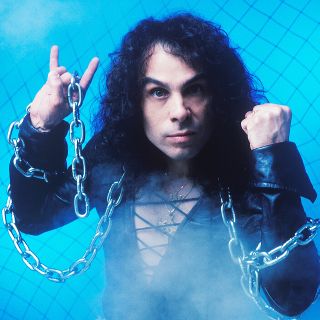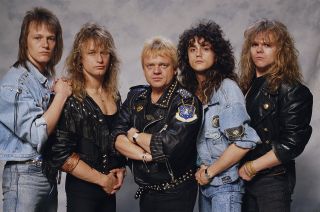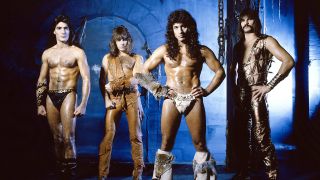On June 7, 2015, Sir Christopher Lee passed away at the grand old age of 93. His obituaries rightly saluted him as a giant of British acting, and listed his towering onscreen achievements: Dracula and Frankenstein’s monster; Saruman in The Lord Of The Rings and Count Dooku in the Star Wars prequels; Scaramanga in Bond movie The Man With The Golden Gun, pagan aristocrat Lord Summerisle in The Wicker Man and even Muhammed Ali Jinnah, founder of Pakistan, in Jinnah.
But few mentioned the unlikely left-turn this film titan made late in his life. From the mid-90s onwards, Lee built a parallel career as a heavy metal vocalist, initially as a guest narrator with Italian power metal band Rhapsody Of Fire before striking out on his own on via a series of concept albums based around the legend of King Charlemagne, with help from Judas Priest guitarist Richie Faulkner.
If the actor’s artistic rebirth was a surprise, the style of music he chose to play less so. Power metal – or symphonic metal, operatic metal, fantasy metal; its names are many – is the aural equivalent of Lee’s acting: sonorous, epic, often bombastic and frequently at arm’s length from reality.
Unlike Sir Christopher, power metal has rarely been taken seriously even though, four decades on, it’s never been bigger. Symphonic Finnish outfit Nightwish – not purebred, but certainly part of the extended tree – headline festivals and stadiums across Europe. Linchpin bands such as Blind Guardian and HammerFall are well into their third decade without showing any sign of slowing down.
But perversely, power metal is the genre that dare not speak its name. Even the people involved in the music seem embarrassed by it.
“Call my music anything you like,” says German singer Tobias Sammet, whose band, Avantasia, have been in the vanguard of the movement for 20 years. “Just don’t call it power metal.”

In truth, the phrase ‘power metal’ is shorthand for something far more complex and ambitious and, well, European. The likes of Avantasia (and Tobias Sammet’s other band, Edguy), Helloween, HammerFall, Stratovarius, Sonata Arctica, Blind Guardian and others share similar characteristics: upbeat rhythms, fast riffing, double bass drums, frequently anthemic choruses and a lead singer who can reach the high notes without doing themselves serious damage. Henrik Klingenberg, ‘keytarist’ with Finnish power metal mainstays Sonata Arctica, has a pithier description of his band’s music: “Pop songs with a metal edge.”
It’s easy to trace power metal’s genesis back to the first few Rainbow albums, where Ritchie Blackmore welded the influence of Middle European classical composers Beethoven and Bach to the amplified power of hard rock. Original Rainbow singer Ronnie James Dio picked up the ball and ran with it via his solo career in the 1980s, while Manowar ramped up the most ridiculous and fantastical aspects of the music, wrapped it up in loincloths and poured baby oil all over it.
The 80s was a boom time. Accept, Jag Panzer, Omen and Vicious Rumours helped carve a respectable niche for the genre at a time when heavy metal was impervious to passing trends. But it would be Helloween’s 1987 album Keeper Of The Seven Keys Part I and its 1988 sequel, …Part II, that would crystallise the emergent scene and act as touchstones for successive genres.
“The catchiness is what we took from those two albums,” says Herman Li, guitarist with British power metal troupe DragonForce. “I was listening to technical thrash, death and prog, but that uplifting triumphant feel was the element we got from Helloween.”
If Helloween embodied the bombastic, near-operatic sound of power metal, then they were also partly to blame for the imagery for which the genre has been mocked. Like a Poundstretcher Tolkein, their lyrics were full of evil wizards, soaring eagles, rampaging monsters and, ahem, malevolent pumpkins. It seems hilariously dated today – so much so that the band’s former singer, Michael Kiske, has spent his subsequent career distancing himself from it – and yet it would define power metal’s overriding lyrical concerns.
Of course, it wasn’t quite as straightforward as that. Helloween and their fantasy-inclined ilk were tapping into a tradition of storytelling that pre-dated film and TV, where written and spoken folk tales and fairy stories acted as dark, moral works dripping with metaphors and warning messages. It was an approach perfected by Ronnie James Dio.
“Dio managed to wrap up current topics in magical, timeless lyrics,” says Tobias Sammet, whose own bands draw inspiration from the twin wellsprings of classical music and fantasy literature. “He was a master of that. I like big language, metaphors… hiding topics in the detail to make people use their imagination and read between the lines. I don’t want to come across too intellectual – it’s rock music after all.”
It’s also one of the reasons why power metal is, on the whole, a distinctly European concern. “The movement finds its home and core audience in Europe because of its inherent ‘European-ness’,” says Sam Dunn, the film-maker behind the Metal Evolution documentary series, which covered power metal in one episode. “It celebrates the historical and sonic traditions of Europe, with links to classical and folk music.”
Its popularity is also evident in South America. Conversely, despite throwing up a number of early progenitors, North America is having none of it.
“People keep saying we’re not metal,” says DragonForce’s Herman Li. “We get so much of that, especially in the US. The younger generation think, ‘You’re not growling, you’re singing it! It’s wrong!’ We get a lot of hate.”
It’s not hard to see why. Unless you’re an aficionado, a band such as Sweden’s HammerFall can seem utterly preposterous with their leather-warrior get up, plastic broadswords and song titles such as The Dragon Lies Bleeding and Hammer Of Justice. It’s not helped by the fact that their tongues are apparently nowhere near their cheeks.
“Sense of humour has absolutely no place in the music itself,” says HammerFall guitarist Oscar Dronjak, who founded the band in 1993. “While performing it, however, it’s a completely different story. Then fun is the essence of life itself! We’re all there for the same reason: to enjoy the hell out of the concert. It’s the best feeling in the entire world, whether you’re on stage or in the audience.”
Of course, it’s that feeling of community that pulls people in. Love it or hate it, power metal is overwhelmingly uplifting, not least live.
“Happiness is what happens when the band and fans come together,” says Wolf Hoffmann of Accept, one of the bands cited as founding fathers of the genre. “We depend on them – only they can bring us to boiling point! It’s a lasting bond. They never get tired to be with their heroes once a year for the rest of their lives. There are lawyers and doctors there who have been with us since I was sixteen years old. I identify with their lifestyle: they have a certain intensity for life.”

Yes, there’s something undeniably nerdy about power metal, and the genre has struggled with the image of people in horned helmets with plastic swords and drinking goblets chained to their waists – check out the videos for Savatage’s Hall Of The Mountain King, Rhapsody’s Rain Of A Thousand Flames, and the truly excruciating Alternate Reality’s The King That Never Was.
Li believes it’s all in the spirit of entertainment, and he’d have no problem seeing those toy weapons return. “When DragonForce first started, people came to the shows with plastic swords,” says Li. “Then when we were playing bigger venues they got confiscated.”
According to Sam Dunn, this nerdiness plays a big part in power metal’s enduring success: “My experience is that the musicians and fans fully embrace the nerdiness. It was refreshing because so many genres are obsessed with being cutting edge.”
If it was ever cool, says Li, the train rolled out of the station long before DragonForce came along. “But I think it’s a bit cooler now. It’s cool to play guitar solos and be good at it. When we started, the guitar magazines didn’t want to talk about solos – now they’re full of lessons on how to shred.”
Even if the genre is unfashionable, its devotees don’t care. Jens Johanssen, keyboardist with Finland’s Stratovarius and the newly revived Rainbow, is proud of power metal’s underdog status.
“Underdog doesn’t listen to ‘cool’ things. People are like, ‘Why are you listening to that 80s shit?’ but Underdog doesn’t give a fuck. Underdog listens to what makes him happy. Power metal will never be fashionable, but it’s all about making people happy, and we can do that better than some hip-hop guy going on about how he’s going to beat his girlfriend up, or how many people he shot. That’s not how we do it – we’re actually much cooler.”
Ultimately, the thing power metal musicians dislike most about the music they play is the name itself. “The term ‘heavy metal’ was very much looked down upon in the early 90s; everyone associated that with a fad that had come and gone,” says Oscar Dronjak. “We said, ‘Fuck that, we are what we are!’ and embraced the epithet ‘heavy metal’ willingly. A couple of years later fans and the media started to call us ‘power metal’. We’d been at the frontline – we stood up for the genre when no one else would – and I’ll be damned if anyone is going to take away our right to it now just because it’s popular among the masses again.”
Tobias Sammet details the phrase he’d prefer instead: “Epic, melodic, hand-made heavy guitar music.” He argues that the genre has suffered from the application of a label that never made sense, and only came about because of the proliferation of other labels. There were so many types of metal flying around that you couldn’t just call power metal what it is: the original-brand metal.
Jens Johanssen views things differently. “I don’t mind ‘power metal’ at all. It’s better if you use an accurate label. It’s our brand identity – people know what they’re getting.”
Dunn suggests a more positive way of looking at the label: “Power metal is about maintaining tradition. It’s the preservationist department of metal. It’s about safeguarding the core elements that make metal what it is: fantasy, melody, power, heroism. There’s something comforting in knowing there are musicians who want to preserve these since so much metal has become overly concerned with upping the ante in speed, extremity, virtuosity, controversy and so on. As metal continues to evolve, we will always need musicians and fans that want metal to remain true to its origins.”
Johanssen is less sure the genre will survive. “We’re one of the few still doing it, and even we aren’t quite power metal any more,” he says, namechecking Japanese outfit Alhambra as one of the few new pure proponents. Asked how the music might evolve, he points to folk metal. “It’s the beardy, kilt-wearing brother. Turisas, Finntroll, Alestorm… they do kick-ass drinking songs, more than us.”
No matter how long it remains with us, it’s perhaps more fitting to think of power metal as just good old heavy metal: steeped in the arts and crafts of the first world, and pioneered by the likes of Dio (for lyrical themes and horns) and Judas Priest (who brought the speed, scream and leather).
And if it’s good enough for Dracula, it should be good enough for everyone else.




